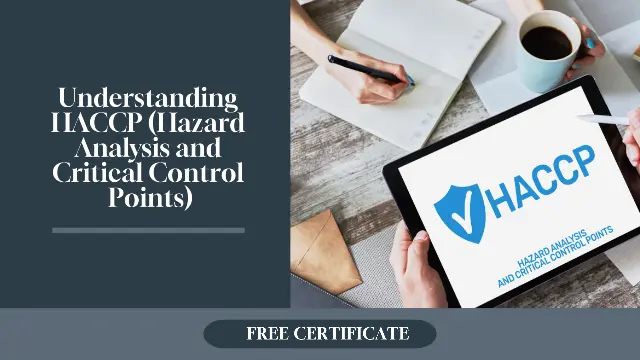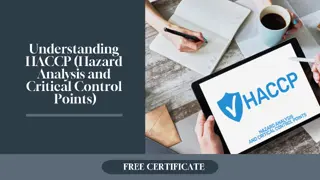
Understanding HACCP (Hazard Analysis and Critical Control Points)
Interactive Video Lessons | Free E-Certificate | Tutor Support
METAVERSESKILLS
Summary
- Certification of Completion - Free
- Tutor is available to students
Add to basket or enquire
Overview
Welcome to the "Understanding HACCP" online course! This comprehensive course is designed to equip you with the knowledge and skills necessary to understand, implement, and manage Hazard Analysis and Critical Control Points (HACCP) systems effectively. Whether you work in the food industry, healthcare, manufacturing, or any other sector that requires rigorous safety standards, this course will provide you with valuable insights into HACCP principles and practices.
Description
Module 1: Introduction to HACCP
- Lesson 1.1: What is HACCP?
- Lesson 1.2: Why is HACCP Important?
- Lesson 1.3: Historical Development of HACCP
- Lesson 1.4: Regulatory and Industry Standards
Module 2: HACCP Principles
- Lesson 2.1: The Seven HACCP Principles
- Lesson 2.2: Identifying Hazards
- Lesson 2.3: Determining Critical Control Points (CCPs)
- Lesson 2.4: Establishing Critical Limits
- Lesson 2.5: Monitoring CCPs
- Lesson 2.6: Corrective Actions
- Lesson 2.7: Verification
- Lesson 2.8: Documentation and Record-Keeping
Module 3: Implementing HACCP
- Lesson 3.1: Pre-Requisite Programs
- Lesson 3.2: Assembling a HACCP Team
- Lesson 3.3: Flow Diagrams and Process Mapping
- Lesson 3.4: Hazard Analysis
- Lesson 3.5: Identifying CCPs
- Lesson 3.6: Establishing Critical Limits
- Lesson 3.7: Monitoring Procedures
- Lesson 3.8: Corrective Action Plans
- Lesson 3.9: Verification and Validation
- Lesson 3.10: Documentation and Record-Keeping
Module 4: HACCP in Different Industries
- Lesson 4.1: Food Industry HACCP
- Lesson 4.2: Healthcare and Pharmaceutical HACCP
- Lesson 4.3: Manufacturing HACCP
- Lesson 4.4: Aerospace and Automotive HACCP
- Lesson 4.5: Implementing HACCP in Your Specific Industry
Module 5: HACCP Audits and Certification
- Lesson 5.1: The Role of Audits in HACCP
- Lesson 5.2: Preparing for HACCP Audits
- Lesson 5.3: Achieving HACCP Certification
- Lesson 5.4: Maintaining HACCP Certification
Module 6: Case Studies and Practical Applications
- Lesson 6.1: Real-World HACCP Success Stories
- Lesson 6.2: Analyzing HACCP Failures and Recalls
- Lesson 6.3: Hands-On HACCP Exercise
Module 7: Future Trends in HACCP
- Lesson 7.1: Emerging Technologies and HACCP
- Lesson 7.2: Sustainability and HACCP
- Lesson 7.3: Globalization and HACCP
Who is this course for?
Recap of Key Takeaways
Continuing Education and Professional Development
Final Assessment and Certification
Requirements
No prior knowledge or experience required
Career path
Anyone working in a food environment across the retail, catering, packaging, manufacturing and distribution sectors
Questions and answers
Currently there are no Q&As for this course. Be the first to ask a question.
Certificates
Certification of Completion
Digital certificate - Included
Reviews
Currently there are no reviews for this course. Be the first to leave a review.
Legal information
This course is advertised on reed.co.uk by the Course Provider, whose terms and conditions apply. Purchases are made directly from the Course Provider, and as such, content and materials are supplied by the Course Provider directly. Reed is acting as agent and not reseller in relation to this course. Reed's only responsibility is to facilitate your payment for the course. It is your responsibility to review and agree to the Course Provider's terms and conditions and satisfy yourself as to the suitability of the course you intend to purchase. Reed will not have any responsibility for the content of the course and/or associated materials.


